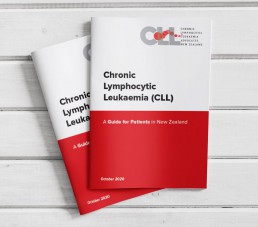The Treatment Journey of a Patient with CLL
The Treatment Journey of a Patient with CLL
This article was originally published on Cure
In this episode of the “CURE Talks Cancer” podcast, we spoke with Mark Hoffman, a patient with chronic lymphocytic leukemia (CLL), about his diagnosis and treatment journey.
Mark Hoffman, 53, a tech salesman in San Diego, started to experience swollen lymph nodes that weren’t going away. He finally sought a specialist who did a lymph node biopsy, determining Mark had CLL.
Mark has a 17p deletion in addition to other high-risk genetic markers. At first, he was under watch and wait for his disease, but his white blood cell count peaked at 90,000 (the normal range is 4,500 to 11,000 per microliter). Luckily, in 2017, Mark began a clinical trial combining Imbruvica (ibrutinib) with Venclexta (venetoclax).
What Is the Outlook for Older Patients with CLL?
What Is the Outlook for Older Patients with CLL?
This article was originally published on DOCwire News
The prognosis for patients with chronic lymphocytic leukemia (CLL) has seen recent improvements, but these benefits largely appear to affect younger patients, with more modest benefits observed among older adults. A study evaluated the prognosis for older adults by comorbidities and frailty, using Medicare data. The results were presented at the 62nd ASH Annual Meeting & Exposition.
The researchers queried Surveillance, Epidemiology, and End Results-Medicare data on adults aged ≥66 years diagnosed with CLL from 2004 through 2015. Patients were then divided into two cohorts, one of which initiated CLL-directed therapy after diagnosis. Both groups had to be continuously enrolled in Medicare Parts A and B and have no managed care for the one-year period after their diagnosis. Patients in the treated cohort who started treatment on or after January 1, 2007, had to also be continuously enrolled in Medicare Part D. The researchers utilized a landmark approach, in which only patients who survived at least one year after their CLL diagnosis (the landmark) were assessed.
For comorbidity, patients were classified as low, medium, or high per the National Cancer Institute Comorbidity Index, and for frailty, Medicare claims algorithms in the year between diagnosis and the landmark (one year following diagnosis) were used.
Of the 12,687 total patients with CLL, 1,543 were in the treated group. In the overall cohort, the mean age at diagnosis was 77 years, and 45% of patients were female; these patients were classified as low (46%), medium (26%), and high (28%) comorbidity. The most prevalent comorbidity was uncomplicated diabetes (25%), followed by chronic pulmonary disease (17%) and congestive heart failure (14%). A high probability of frailty—defined as ≥10%—was observed in 26% of patients.
John N. Allan, MD, on Research Coming Out of ASH for CLL
John N. Allan, MD, on Research Coming Out of ASH for CLL
This article was originally published on Cancer Network
n an interview with CancerNetwork®, John N. Allan, MD, assistant professor of medicine in the Division of Hematology and Medical Oncology at Weill Cornell Medicine, discussed the latest research coming out of the 62nd American Society of Hematology (ASH) Annual Meeting for patients with chronic lymphocytic leukemia (CLL).
Transcription:
Yeah, so one of the big things I’m most interested about this year’s ASH is as when I was reviewing the abstracts was seeing, how much data is going to be emerging in terms of the combinations and really seeing how deep can these responses go? How durable are these responses after maximal therapy, so to speak, and stopping or fixed durations of therapies and so, so that’ll be really important to keep an eye on. As well as, you know, we’re getting better at understanding resistant mechanisms to these targeted agents, so, looking at how patients relapse, how do they respond to new therapies after they’ve relapsed, especially if they’ve had treatment holidays. So, these are things that will be at this year’s ASH and looking forward to digesting that data.
An Analysis of CLL in Adolescents and Young Adults
An Analysis of CLL in Adolescents and Young Adults
This article was originally published on Docwire News
Most patients diagnosed with chronic lymphocytic leukemia (CLL) are older; the median age at diagnosis is 70 years. Less than 2% of patients are younger than 45 years. Previous research has not evaluated next-generation sequencing (NGS) gene mutation and novel oral therapies in adolescent and young adult (AYA) patients with CLL. A retrospective study evaluated disease characteristics that impact CLL outcomes in AYA patients. The data were presented at the 62nd ASH Annual Meeting & Exposition.
Between January 1, 2000, and December 31, 2019, 227 patients aged 15 to 39 years were diagnosed with CLL/small lymphocytic lymphoma at a single institution. Labs and Rai stage were recorded if available pre-treatment and within 12 months of diagnosis. Fluorescence in situ hybridization (FISH), cytogenetics, CD38, ZAP-70, gene mutations were collected from any time pre-treatment.
The median age at the time of diagnosis was 37 years (range, 17-39 years); from diagnosis, patients were followed for a median of 7.1 years (range, 0-19.3 years).
Among the 167 patients with available pre-treatment FISH data, 65 (39%) had del(13q), 26 (16%) had trisomy 12, 24 (14%) had del(11q), seven (4%) had del(17p), and 45 (27%) had no FISH abnormality. Among the 159 patients with available immunoglobulin heavy chain variable (IGHV) data, 82 (52%) had mutated and 77 (48%) unmutated IGHV. Only 3% of patients had a first-degree relative with CLL. The following rates of gene mutation were identified: TP53, 3% (n=2/59); NOTCH1, 18% (n=8/45); SF3B1, 16% (n=7/45); POT1, 9% (n=4/45); BIRC3, 7% (n=3/45); and MYD88, 11% (n=5/45). Outcomes could not be evaluated by mutation status because of the limited number of patients with available data.
Venclexta PBS listed as first line therapy for CLL patients unfit for chemotherapy
Venclexta PBS listed as first line therapy for CLL patients unfit for chemotherapy
This article was originally published on Mirage
- VENCLEXTA plus obinutuzumab is a combination, fixed duration therapy for previously untreated patients with CLL who are unfit for chemotherapy
- VENCLEXTA was developed out of the Australian discovery that a protein called BCL-2 helps CLL cells survive. Blocking this protein helps to kill and reduce the number of these cancer cells(1)
- Over 1,800 people are predicted to be diagnosed with CLL in Australia this year making it the most common type of leukaemia diagnosed in Australia
Monday 30 November 2020, Sydney – AbbVie (NYSE: ABBV) Australia has welcomed the Government’s announcement that Venclexta® (venetoclax) in combination with obinutuzumab will be available to eligible Australians with Chronic Lymphocytic Leukaemia (CLL) as a first line therapy via the Pharmaceutical Benefits Scheme (PBS) from the 1st December 2020. This PBS listing will allow CLL patients who cannot be treated with standard chemotherapy-based treatments to have affordable access to this first line combination treatment.
Venclexta in combination with obinutuzumab is a targeted, 12-month duration treatment that is to be reimbursed for patients with previously untreated CLL, who are unfit for conventional chemotherapy. (1,5)
Venclexta works by blocking a protein in the body (BCL-2) that helps these cancer cells survive. Blocking this protein helps to kill and reduce the number of cancer cells. It is an oral tablet that can be taken daily in combination with intravenous obinutuzumab.(1)
ASH 2020 CLL Daily Wrap-Up
ASH 2020 CLL Daily Wrap-Up
This article was originally published on Patient Power
Overview
Join Patient Power on Tuesday, December 8th at 4pm PT/7pm ET for a live recap of the latest chronic lymphocytic leukemia (CLL) news from the 62nd American Society of Hematology (ASH) Annual Meeting. ASH is the world’s most comprehensive hematology event of the year where experts review thousands of scientific abstracts, highlighting updates on the most critical topics in hematology. Some of the field’s top doctors will share their thoughts on emerging research, clinical trials, and how current events such as COVID-19 are impacting cancer patients. Attend live to hear exciting CLL news from ASH 2020!
This program is sponsored by Pharmacyclics. This organization has no editorial control. It is produced by Patient Power. Patient Power is solely responsible for program content.
CLL Advocates NZ Newsletter Issue 6
CLL Advocates NZ Newsletter Issue 6
Friends of CLLANZ
Funding has been received, with thanks, from the BOP Medical Research Trust for a research project to be done as a summer studentship, by fifth year medical student, Andrew Weston, on “second primary malignancies in NZ CLL patients”.
Second primary malignancies are important in CLL, where the impaired immune system is not as able to deal to developing malignancies as people with normal immune systems can. As a consequence, about one third of CLL patients die of a second primary malignancy, such as melanoma, colon cancer, and pancreatic cancer. Some of these cancers have well-recognised screening procedures to detect early stage cancers, which can have a better outcomes to treatment then, compared to when they are picked up when symptoms develop.
Regular skin checks, and colonoscopy are two good examples of this screening approach.
I would be interested to hear from any of the CLLANZ Friends who are in this group i.e. have had a second primary malignancy, as it may help with the study.
I encourage you to spread the word about the existence of CLLANZ to any New Zealanders you know who are living with CLL, and encourage them to make contact with us.
The other request is to encourage you all to take an active approach to our Facebook group, and to continue to read HealthUnlocked and Patient Power newsletters , which are both easy groups to join, or can be read on our website.
A CLLANZ trustees meeting will be held this month, to review the year gone by, and to plan for the next twelve months. Please contact me at neil@clladvocates.nz to let me know about any topics you would like considered for the agenda.
Best wishes
Neil Graham
CLL Advocates NZ Newsletter Issue 5
CLL Advocates NZ Newsletter Issue 5
Friends of CLL Advocates NZ
I’m pleased to report on a very successful inaugural CLLANZ seminar on 14 October, co-hosted by LBC. Around 100 people attended either by zoom or in person in LBC offices up and down the country. There were three excellent presentations by three of NZ’s most authoritative clinicians on CLL. Dr Peter Browett described the disease, Dr Gillian Corbett spoke on therapy, and Dr Rob Weinkove explained likely future directions for CLL treatment. An informative panel discussion and questions session concluded the two-hour event.
I thank all those who helped organise and manage this event, and particularly LBC for providing their facilities. This will hopefully be the first of many such events in years to come.
The seminar has provided us with an up-to-date, comprehensive patient resource on CLL in NZ. A video of the full event will shortly be posted on our website, and the presentations can be found here.
Identifying the priorities we should be pushing for in CLL treatment was a key theme of the event. These included having testing available in NZ for IgVH mutations, and I’m pleased to say this has already stimulated momentum to develop this.
As well as being our inaugural seminar the event was the formal launch of CLLANZ, almost two years after we first discussed the idea of starting the group, somewhat delayed by COVID 19.
It was also the formal launch of our booklet “CLL – A Guide for Patients in NZ”. Again, dedicated individual and team effort resulted in an excellent, informative document, which is available here on our website and in hard copy. If you would like a hard copy please send us your postal address. The booklet is also being distributed to CLL clinics around NZ, where you can also pick up a copy. Feedback on this is welcomed.
We’ve already had a lot of positive feedback on the event, along with suggestions for future seminar themes, and would welcome further thoughts on this.
Best wishes
Neil Graham
Novel Prognostic Model Predictive of Survival in Ibrutinib-Treated CLL
Novel Prognostic Model Predictive of Survival in Ibrutinib-Treated Chronic Lymphocytic Leukemia
This article was originally published by Hematology Advisor
A 4-factor prognostic model may help to identify patients with chronic lymphocytic leukemia (CLL) at risk of ibrutinib failure, according to research published in the Journal of Clinical Oncology.
As CLL is a “clonal expansion of mature B cells drive by constitutive activation of B-cell receptor (BCR) signaling,” previous studies suggest that the selective inhibition of BCR and BCL-2 protein may significantly improve outcomes in some patients with CLL compared with chemotherapy as a first-line therapy.
Ibrutinib, a Bruton tyrosine kinase inhibitor, is frequently used in the CLL setting, though drug resistance invariably evolves, with relapse occurring often with ibrutinib monotherapy.
Identifying those at risk of relapse after ibrutinib therapy would improve treatment decision-making among patients with CLL. While there are existing prognostic indices, none specifically evaluate for criteria known to be linked with the evolution of ibrutinib resistance. In the present study, the researchers evaluated and validated the effectiveness of a 4-factor prognostic model among patients with CLL treated with ibrutinib.
CLL Advocates NZ Launches a New Zealand Patient Guide
CLL Advocates NZ Launches a New Zealand Patient Guide
CLL Advocates NZ is pleased to announce the official launch of its patient booklet, CLL – A Guide for Patients in New Zealand. It has been made available in both a digital download and as a hardcopy booklet.
The booklet is being launched at CLL Advocates NZ’s inaugural patient seminar in Auckland and online tonight (14 October). The seminar will discuss ‘What is the state-of-the-art treatment for CLL in New Zealand?’
The booklet was compiled by Leukaemia Care, a national UK blood cancer support charity. Leukaemia Care has kindly granted us permission to adapt the booklet for the New Zealand CLL setting, and to publish it here on our website, and make it available as a printed booklet for distribution in New Zealand. This agreement is in line with CLL Advocates NZ’s commitment to working closely with other CLL patient advocacy groups and to avoid duplicating available high quality work undertaken by others.
Adaptation of the booklet for New Zealand conditions has been undertaken by Gillian Corbett MBChB, FRACPath, MRCP, FRACP, haematologist and Trustee, CLL Advocates NZ, Neil Graham FRACP, FRCP, Executive Director, CLL Advocates NZ, and Catherine Isaac, Trustee, CLL Advocates NZ.
We are most grateful to Leukaemia Care for this very valuable contribution to our work.
To learn more about the booklet, download it, or to request a hardcopy click here.







